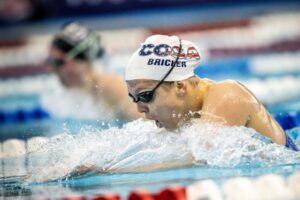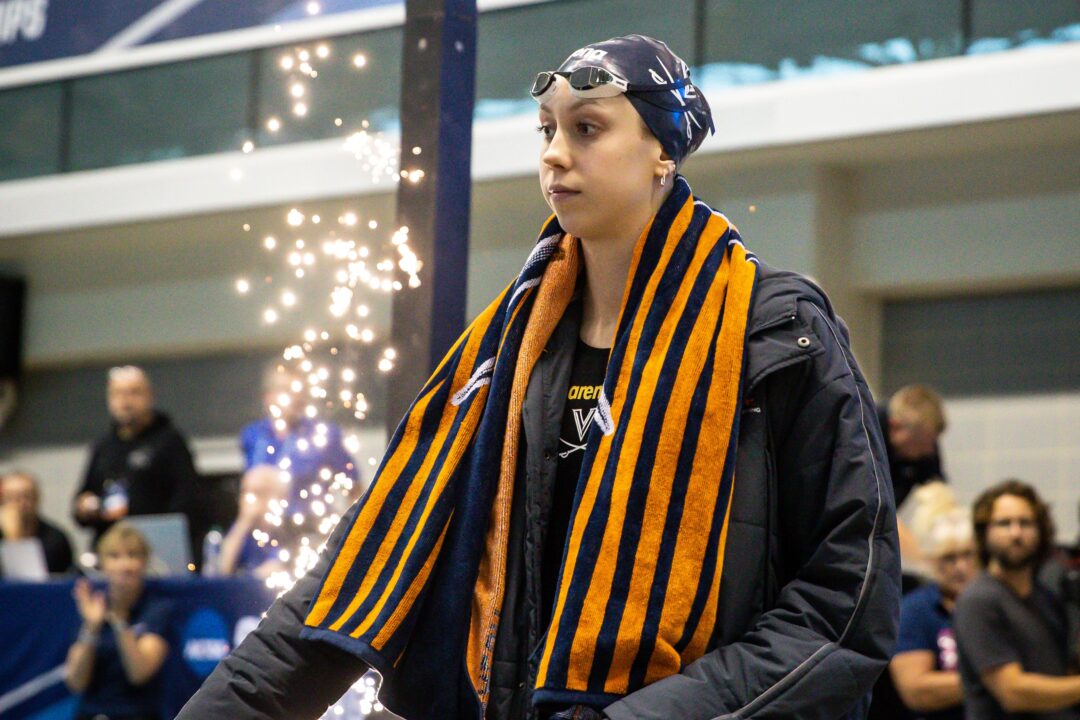Welcome to Week 6 of our 2023-24 NCAA weekly recaps! Each week in these recaps, we take a look at some of the highlights from around the NCAA, do some deep dives, discuss any trends we’re seeing, etc. This week, we’re talking about last weekend’s division clashes, Stanford’s early returns, and the mid-major breaststrokers showing out.
Top Ranked Teams in D1 and D2 Face Off
This past weekend we saw top ranked teams in Division I and Division II go head-to-head. The #1 Virginia women hosted #2 Texas, while in Division II, Indianapolis, who won their first national title last season, raced the #3 McKendree men on senior day. In both meets, the higher ranked team prevailed: Virginia got revenge for last year’s loss and UIndy handed McKendree their first dual meet loss since the 2021-22 season.

Cedric Buessing (photo: Jack Spitser)
UIndy won 12 of the 16 events, including both relays and boards for a final score of 189-105. Cedric Buessing won three individual events for the Hounds, putting up season-bests of 4:27.97/9:11.64 in the 500/1000 free, the latter of which is the fastest D2 time this year. Senior Jeron Thompson swam season-bests of 44.97/48.39 in the 100 free/100 back, winning both events and also contributing to two winning relays. The Bearcats picked up their event wins courtesy of Felipe Pinheiro (100/200 breast), Leo Gandaria-Hernandez (200 free), and Jackson Lustig.
We’ve already done a lot of coverage of the Virginia vs. Texas two-day affair, so we’ll keep this recap quick. The Virginia women beat Texas both days of the meet. Gretchen Walsh was the star of the show, putting together arguably the best unsuited dual meet performance we’ve seen. Walsh set an American record in the 50 back (22.54), fired off a PB in the 100 fly (49.11), and swam 20.95 in the 50 free. Jasmine Nocentini had a strong meet, cementing herself as an important piece in Virginia’s campaign for a fourth national title. Teams were both missing swimmers due to Pan Ams; the absences had more of an effect on a Texas women’s team that was without names like Kelly Pash and Olivia Bray, but the Longhorns still turned in some solid swims, especially newcomers Erin Gemmell and Berit Berglund.
Obviously, dual meets are different formats than NCAAs, but winning these meets decisively is a confidence boost for these teams as they establish themselves as the teams to beat not just on paper but in practice.
Early Returns for Stanford
There were major areas of concern for both the Stanford women’s and men’s teams heading into this season. For the women, losing Torri Huske, Claire Curzan, and Taylor Ruck was a major blow, as the three contributed major points with their individual swims and their relay value. This season, they’re going to need to rely on swimmers who until now were seen as depth pieces to step up. And early on, it’s been freshman Caroline Bricker who’s been leading the way for the Cardinal.

Caroline Bricker (photo: Jack Spitser)
Bricker’s breaststroke capabilities were her major value to #10 Stanford; they’ve been looking for that missing piece on the medley relay for a long time. But Bricker’s put her versatility on display in her first few meets as a Cardinal. The freshman headlined their win against Arkansas last Friday, winning three events in NCAA-leading personal best times. She swam a new lifetime best in the 200 breaststroke (2:07.17) by almost a second. Then, she cut a second off her 200 fly PB (1:54.60) and four seconds from her 400 IM (4:05.51).
Her 200 breast and 400 IM times would’ve made the 2023 NCAA ‘A’ final while her 200 fly time would’ve landed her in the ‘B’ final. That’s exactly what Stanford needs this season: swimmers stepping up and making it back in multiple events.
The #8 Stanford men have lost key swimmers as well; Leon MacAlister and Jonny Affeld are gone, and Andrei Minakov, Ron Polonsky, and Zhier Fan are redshirting at least the fall semester.
Minakov, MacAlister, Polonsky, and Affeld all played major roles on the Stanford relays, so it’s really going to hurt if they don’t get at least Minakov or Polonsky back. Minakov’s departure is a loss for the sprint group, which has been one of Stanford’s weakest disciplines the last few seasons. This was underlined by the 200 free relay being their lowest-scoring relay at NCAAs the in 2022 and 2023.
But interestingly, it’s this relay that’s been their best so far this season. Rafael Gu (19.72), Jonathan Tan (19.64), Andres Dupont (19.61), and Luke Maurer (19.62) but up an 1:18.59, ranking them 4th in the NCAA this season. Dupont’s been a bright spot through the early season, adding a 42.65/1:34.28 200 frees. The latter of those swims puts him just behind the Maurer brothers as the three rank 5th-7th in the NCAA. Stanford hasn’t raced the 800 free relay yet, but keep an eye out for it at midseasons–it’s shaping up to be the strongest of their five.
Of course, in addition to all the departures, the Stanford men brought in a talented and promising freshman class. In particular, Rex Maurer has shone so far, posting 1:33.88/4:19.45 200/500 frees, as well as 3:44.70 in the 400 IM, which slots him at #2 in the NCAA between Sun Devil pair Leon Marchand and Hubert Kos.
Mid-Major Breaststrokers Make Noise

Brian Benzing (photo: Jack Spitser)
The mid-major breaststrokers showed up this weekend. From the Patriot League’s 200 breaststrokers, Army’s Aurelie Migault clocked a season best 2:15.05 at Army’s dual with BU, and Loyola’s Lily Mead followed close behind with a 2:15.09 for a meet record at the Thomas Murphy Invitational. Mead’s versatility is one of her biggest assets to the Greyhounds; she didn’t even race breaststroke indivudally at the 2023 Patriot League Championships, though her 200 breast PB would’ve won. Mead won two other events at the Thomas Murphy Invite, the 200 back (1:57.85) and 400 IM (4:17.86); these top the Patriot League, and the latter is a PB.
Brian Benzing, a dark horse candidate for the men’s 100 breast NCAA title this season, went season-bests of 52.71/1:57.97, also setting meet records and breaking 53 in the 100 breast for the first time this season. Benzing did not race breaststroke at this meet last year, so that’s an interesting change to his schedule to note. His times rank him 5th and 20th in the NCAA this seaon, respectively. Last season, Logan Kelly became one of IUPUI’s first-ever NCAA qualifiers. He’s back in action this season, throwing down a 53.60/1:58.46 double against Cleveland State.
Quick Hits
- The Indiana men showed up at their tri meet with Auburn and Mizzou. Ahmed Hafnaoui made his SCY debut with 4:18.62/8:55.74 in the 500/1000. Brendan Burns did his thing, winning the 100 back/200 back/200 fly in 47.17/1:44.14/1:44.80. Their sprinters have stepped up after losing Van Mathias; Tomer Frankel (43.72), Rafael Miroslaw (42.58), Gavin Wright (43.59), and Mikkel Lee (42.79) turned in a 2:52.60 in the 400 free relay.
- Like the Virginia women, the Cavalier men also beat Texas both days of the meet. At the Friday superfinals, the meet came down to the final relay. Picking up both wins is huge for the men, who had a bit of a misfire at 2023 NCAAs and couldn’t match Florida’s depth. Noah Nichols showing up to swim from the airport after Pan Ams and dropping a season-best 52.39 was pretty cool as well.
- Also at the Thomas Murphy Invite, Loyola’s Henry Mueller erased Michael Phelps‘ name from another record board. Mueller broke the 200 backstroke pool record that Phelps set at 16-years-old in 2002, lowering the mark from 1:46.15 to 1:44.68.
- It’s not every day that you see a tie at an NCAA meet: the Rutgers and Toronto women had a stalemate at their dual this weekend, each scoring 131 points.
